Julie Bindel and I have several things in common for certain, one being our first names and the other that we are both women, she coming from the “adult human female” route and me from the self-identifying gender-fluid route.
Both equally valid and legitimate identities.
I chose “Julie” when I came out as transgender in my mid-fifties because I liked the feminine phonetics and traditionality of the name, and it marked the beginning of my life as a self-identifying gender fluid trans woman.
To really understand what is a woman in modern society we need to analyse from first principles the definition of the word. And that’s it in the most basic analysis, it’s a word, nothing more, nothing less, three consonants and two vowels strung together.
Words are then given meaning by society and can change over time, for example mother used to be someone who gave birth to a child, but now also means an adoptive mother. ‘Gay’ used to be someone who was very happy, but now means a person who is same-sex attracted, and tweet used to be the sound a bird made…now many of us tweet on Twitter.
In today’s society of 21st century, “woman” has evolved to have several meanings.
It can be an “adult human female” as Julie Bindel identifies, but also someone who self-identifies as a woman. This is what trans women have been doing for decades, and they have been accepted and embraced into womanhood by the vast majority of women, all the evidence suggests as such. Trans women invariably retain aspects of male biology, for example a prostate and male chromosomes, but they are accepted and respected as women because of a combination of their overt female biology, gendered presentation and behaviours.
The definition of “woman” is now hotly debated across the country, and even across the floors of the two respective Houses of Parliament, but the only realistic, quantifiable, and fair definition that is inclusive of all women, is:
A woman is anyone that society accepts and respects as a woman
The latest poll that addresses the acceptance of trans women by society was undertaken by Savanta ComRes for BBC Scotland and shows that the majority of Scots are in support, rather than oppose, gender recognition laws that “move to a system of self-declaration; the act of being able to access a Gender Recognition Certificate with greater dignity and without the need for a medical diagnosis”. In other words, they accept that the word woman is not uniquely defined by the transphobic phrase “adult human female”.
The backdrop to this survey and other similar surveys is the need to understand the true support that trans people have in society, and to weigh this against the opposition to trans-people as identified, for example, by the recent Council For Europe debate on combatting hate crime, revealing the UK as one of the worst anti-LGBT countries in Europe, alongside Russia and Poland for example.
Over the past few years as a transgender support charity volunteer, I have worked with local institutions that have to care for victims of hate crime, including councils, rape crisis centres, sexual assault referral centres, and a whole variety of NHS hospitals.
During the course of this work, including being a Third-Party Hate Crime Reporting Officer, I have read specific details of actual hate crimes. Much of it makes for harrowing and upsetting reading; for example a gay couple subjected to years of abuse by their homophobic neighbours, a trans woman starving in her flat because she cannot bear to confront the local youths patrolling her street, ready to launch into a tirade of “f**king tr**ny”, “show us yer cock mate”, and of the interracial couple with their 5-year old daughter being told by a random guy in the street to “f**k off back to where you belong and take your half-cast brat with you”.
Although these attacks were mostly just fleeting and momentary, the emotional burden continues for years, sometimes decades, after the event; sleepless nights, constant fear and agoraphobia, PTSD, anxiety, depression, loneliness, anger, hopelessness, and more.
These are all hate crimes for a very good reason, and many people argue that misogyny (at it’s simplest defined as a hatred of women) should also join the list because it has an equally devastating effect on the victims and ruin their mental health and subsequent lives.
The Government has ruled out making misogyny a hate crime for the simple reason that there is so much of it, that the police will be totally overwhelmed; a sad, but true, ‘catch 22’.
It is so obvious to any self-respecting feminist that we must advocate and protest to make the resources available so that misogyny is criminalised.
Indeed, I can think of no feminist society (I immediately think of the Fawcett Society to name one of dozens) who don’t campaign to make misogyny a hate crime and it is Labour Party Policy (along with other parties, excluding Tories I guess) to do the same.
But in a tweet on 18 Feb 22 Julie Bindel stated “There are extremely compelling reasons to not make misogyny a hate crime, and I would urge all those advocating for it to do some reading, and talk to those of us that have campaigned against misogyny for decades. We know what we are talking about.”
The reason appears to be because she thinks that trans women could, “accuse a woman of being ‘cismisogynistic’ and criminalise us for speaking out against trans ideology”. It also seems she is also concerned that if misogyny was criminalised, the protection would apply to trans women as well.
Just 0.5% of the UK population are trans women. There are 34 million natal women – all being thrown under the bus!
Trans women are accused by gender critical people of being “trans ideologists”, members of the “trans-cult”, and a threat to women’s safe spaces; they are paedophiles, fetishists, misogynists, and are erasing from society women in general and lesbians in particular; but gender critical people offer not one shred of objective empirical evidence of these claims, despite the fact that trans women have existed in society for decades.
All the evidence shows that trans women are brave and courageous people who adjust their gender presentation to optimise their mental health, even in the face of a transphobic and unforgiving minority; and if there is anything we have learned in this pandemic, is that people who look after their good health protect the NHS and save lives.
Bindel surely knows this to be true?
Surely she knows there is no evidence of these anti-trans accusations?
So it must appear she has decided to pursue another avenue of baseless gas lighting, which is to advocate that trans women should not be protected by misogyny laws because they aren’t real women, not “adult human females”.
In pursuing this new offensive and weaponising this new phrase, “‘cismisogynistic”, Bindel appears to be trying to open up a new front in this war of attrition – because all the other tactics of her gender critical ideology have failed and have been called out politically, as we have seen in the Council of Europe, and socially, as we can see in the most recent polls.
Is Julie Bindel, et al, trying (with increasing desperation) to demonise trans-people?
A tactic that has been used against many minorities throughout history, the most notable during World War Two.
These types of acts are not those of decent feminists, but by a tiny prejudiced minority clinging by their fingertips to the anachronistic and transphobic definition of woman as an “adult human female”, so desperate that they are resorting to tactics that the world has previously identified as abhorrent, disgusting and inhumane.
Opinion by Julie Miller




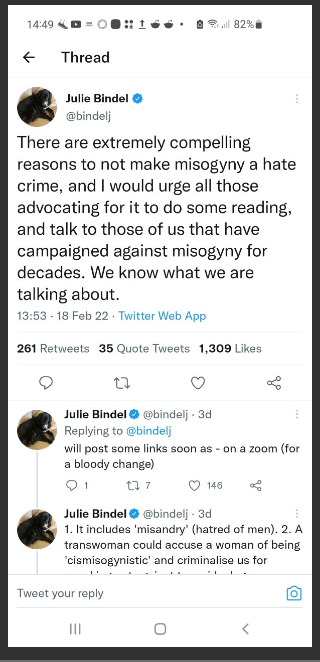
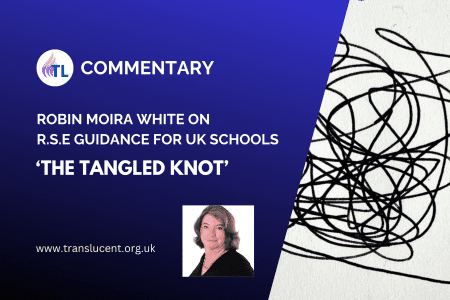
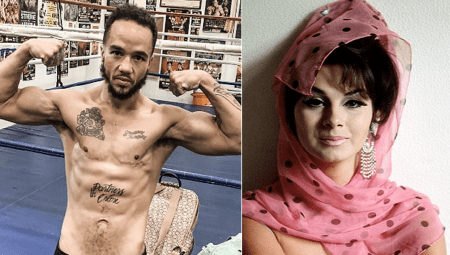
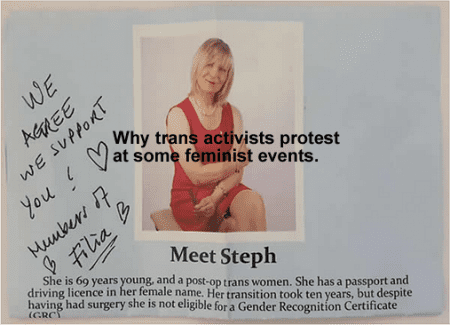
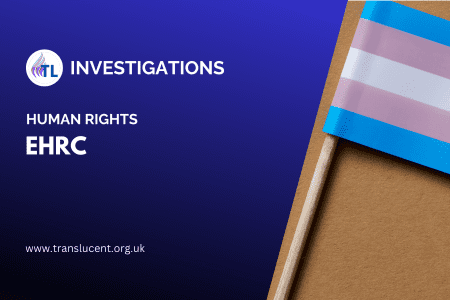
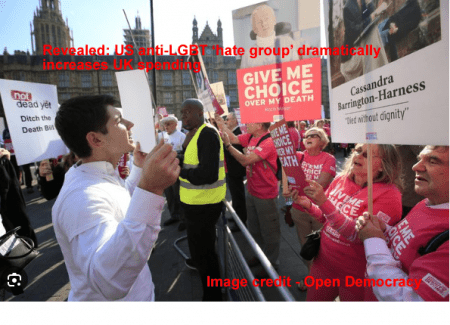

 To provide the best experiences, we use technologies like cookies to store and/or access device information. Consenting to these technologies will allow us to process data such as browsing behaviour or unique IDs on this site. Not consenting or withdrawing consent, may adversely affect certain features and functions.
To provide the best experiences, we use technologies like cookies to store and/or access device information. Consenting to these technologies will allow us to process data such as browsing behaviour or unique IDs on this site. Not consenting or withdrawing consent, may adversely affect certain features and functions.